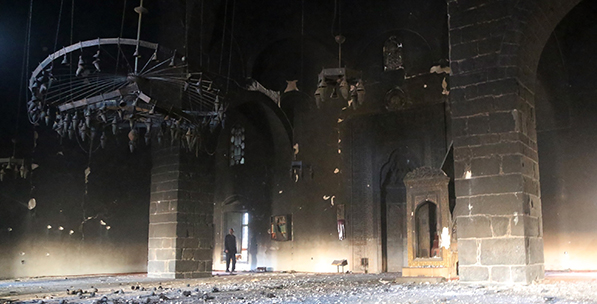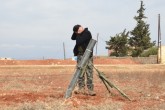One of the most important matters on the agenda of Turkish politics currently is the debate on returning to the reconciliation process. In the past week, one of the most frequently asked questions to President Recep Tayyip Erdoğan during his meetings in Washington was when the reconciliation process will be reinitiated. On all platforms, Erdoğan answered that he “had not ended the reconciliation process, it has only been shelved.” He said that the main reason behind shelving the process was the frequency of the PKK’s terror activities in Turkey, that Turkey’s biggest problem at the moment was terror and that the government prioritizes the resolution of this problem first. Erdoğan also said that Ankara expects support from all allies, with the U.S. at the lead, and that Turkey’s primary expectation is to be understood correctly by the U.S.
The references to the return to the reconciliation process that we came across in Washington last week then became a domestic political debate in Turkey after Erdoğan returned. Although the Peoples’ Democratic Party (HDP) occasionally brings returning to the reconciliation process to the agenda alongside the terms resolution, peace and negotiations, it is widely known that the HDP’s main aim is to provide strategic and tactical support to the PKK’s armed struggle.
At the beginning of this week, however, various emphases began to be made from within the Justice and Development Party (AK Party) about the return to the reconciliation process. Former Deputy Prime Minister Bulent Arınç spoke of “ending terror and stopping the bloodshed and tears, and the need for a widely encompassing search for a solution on political ground.” Some authors from the AK Party environs also mentioned the argument of the need to return to the reconciliation process.
Above all else, it is remarkable that this was expressed right after Erdoğan’s return from the U.S. However, we must state that it does not find strong support in mainstream AK Party politics or its base. Erdoğan gave a very definitive answer to those who say there must be a return to the reconciliation process, saying: “We will continue the struggle until the last terrorist, the last threat has been removed,” and asserting that “there is nothing to be negotiated or talked about.”
The main impetus prompting Erdoğan to this position is the PKK’s attempt to utilize this negotiation debate, let alone the negotiations themselves, as an opportunity to widen its sphere of sovereignty and to compensate for its losses. Over this rhetoric of a return to negotiations, the PKK wants above all to regain the base it has lost. An important part of the PKK base has been questioning why, despite gathering 6 million votes in the June 7 election, the HDP did not choose to pursue a legitimate political course and rather leaned toward armed struggle and caused daily life to be paralyzed in a part of the country. They are taking this out on the PKK.
Secondly, through the rhetoric of returning to negotiations, the PKK is trying to increase the support and legitimacy it receives on the international level. The PKK suffered serious losses during the wide-ranging operations against it after July 2015. Undoubtedly, this does not mean that the PKK’s capacity for activity has been removed.
The PKK regarded the gains it made in northern Syria since 2014 as a historical opportunity and ended the reconciliation process in order to carry these gains into Turkey through an armed struggle. However, thinking that it would be able to open up a large area in Turkey through an armed struggle by taking its gains in northern Syria as a basis, the PKK began to lose the advantages it had gained through the armed struggle it had been leading since last July in northern Syria. What is more, it began to pay even heavier costs in Syria.
The U.S. is unable to establish its desired strategy in Syria due to Ankara’s sensibility on the issue of the PKK, and the Syrian Kurdish Democratic Union Party (PYD) and its armed People’s Protection Units (YPG) by extension, and the number of those expressing the damages of the concept that the groups fight against DAESH that has been so engaged with the YPG (and PKK) has been increasing among American foreign policy makers. It is not hard to predict that this situation will make the PKK pay even heavier costs in the upcoming period.
In such an environment, the PKK’s use of the rhetoric of returning to the reconciliation process in order to enlarge its own area and to surpass the challenges and problems it is faced with will not mean anything for Turkey’s interests or for peace in the country or the region.
[Daily Sabah, April 8, 2016]
In this article
- Foreign Policy
- Opinion
- 2014
- 2015
- 2016
- DAESH
- Daily Sabah
- Democratic Union Party (PYD)
- Democratization
- Fight against DAESH
- Fight Against Terror
- Kurdistan Workers' Party Terrorist Organization (PKK)
- Middle East
- People's Protection Units (YPG)
- PKK - YPG - SDF - PYD - YPJ - SDG - HBDH - HPG - KCK - PJAK - TAK - YBŞ
- Prime Minister
- Recep Tayyip Erdoğan
- Syria
- Syrian Civil War
- Syrian Conflict
- Syrian Crisis
- Terror
- The President of the Republic of Türkiye
- Turkish Foreign Policy
- Turkish President
- Turkish-American Relations
- Türkiye-US Relations
- Türkiye's Justice and Development Party | AK Party (AK Parti)
- Türkiye's Peoples' Democratic Party (HDP)
- United States (US)



